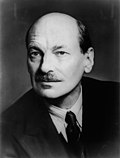25 October 1951 | |||||||||||||||||||||||||||||||||||||||||
All 71 Scottish seats to the House of Commons | |||||||||||||||||||||||||||||||||||||||||
|---|---|---|---|---|---|---|---|---|---|---|---|---|---|---|---|---|---|---|---|---|---|---|---|---|---|---|---|---|---|---|---|---|---|---|---|---|---|---|---|---|---|
| |||||||||||||||||||||||||||||||||||||||||
 Results of the 1951 election in Scotland Conservative/Unionist Labour Liberal National Liberal | |||||||||||||||||||||||||||||||||||||||||
A general election was held in the United Kingdom on Thursday 25 October 1951, and all 71 seats in Scotland were contested. [1] [2] The Unionists, together with their allies the National Liberals, ended up narrowly ahead of Labour in terms of vote share, however the two were equal in terms of seats won, each taking 35 seats. When combined with results from across the UK, the Conservatives (with whom the Unionists sat at Westminster) won a majority of 17 seats, despite winning slightly fewer votes than Labour. The election is noteworthy for being, as of 2024, the last election in which the Conservatives did better in Scotland than in England. It is also the most recent election where no party won a majority of Scottish seats.
Contents
The Liberals were reduced to one Scottish seat, Orkney and Shetland, losing their only other seat (Roxburgh and Selkirk) to the Unionists.


